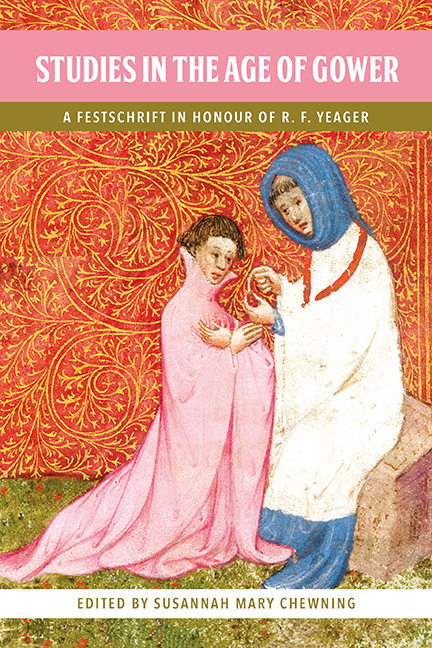Book contents
- Frontmatter
- Contents
- List of Illustrations
- Notes on Contributors
- Acknowledgements
- List of Abbreviations
- Introduction
- Part I Text
- Part II Gender
- Part III Time
- Part IV Spirit
- Part V Intersections
- A Personal Tribute to R.F. Yeager
- Bibliography of R.F. Yeager’s Writings
- General Bibliography
- Index
- Miscellaneous Endmatter
14 - A Poet at Work: John Gower’s Revisions to the “Tale of Rosiphilee”
Published online by Cambridge University Press: 28 April 2020
- Frontmatter
- Contents
- List of Illustrations
- Notes on Contributors
- Acknowledgements
- List of Abbreviations
- Introduction
- Part I Text
- Part II Gender
- Part III Time
- Part IV Spirit
- Part V Intersections
- A Personal Tribute to R.F. Yeager
- Bibliography of R.F. Yeager’s Writings
- General Bibliography
- Index
- Miscellaneous Endmatter
Summary
WHILE MUCH SCHOLARLY ATTENTION has been devoted to John Gower's revisions in Confessio Amantis, most of it has had to do with the political conditions under which he was working. One prominent exception involves his rewriting of what Peter Nicholson has called, “the two most famous lines in the entire poem” – a process that C.S. Lewis in The Allegory of Love characterized as purely aesthetic:
The famous line
The beaute faye upon her face
attained its present form only by successive revisions – revisions which demonstrate, so far as such things can be demonstrated, the working of a fine, and finely self-critical, poetic impulse. The first version –
The beaute of hire face schon
Wel bryhtere than the Cristall ston,
– is just what would have contented the ordinary ‘unconscious’ spinner of yarns in rhyme; but it did not content Gower.
Gower, Lewis goes on to suggest, excelled at what Dryden was to call “the fairy way of writing” (220), and his careful revision of this passage from “The Tale of Rosiphilee” offers one instance of his responding to its appeal.
John Lawlor, in an oddly disputatious piece intended for a volume published in Lewis’ memory, takes issue with this reading. It betrays, he suggests, an overly romanticized view of Gower – Lewis had gone so far as to claim that Gower was “‘romantic’ in the nineteenth-century sense of the word” (220) – because it fails to appreciate that the word faye represents “a possible mode of being.” “The apparatus of past belief,” he writes, in an interesting anticipation of Todorov's distinction between the fantastic and the marvelous, “can become the vehicle of ‘romantic’ treatment only when it is freed from every touch of objective likelihood” (126). In other words, in a world where people might still believe in their existence, fairies could not possibly function as the vehicles of romantic fantasy. I agree with Lawlor's criticism here – though in general it seems to me far more appropriate to the Lewis of the Allegory of Love (written in 1936) than to the one of The Discarded Image (published posthumously thirty years later) – but I suspect that there are even more cogent objections to be raised to Lewis’ argument.
- Type
- Chapter
- Information
- Studies in the Age of GowerA Festschrift in Honour of Robert F. Yeager, pp. 217 - 226Publisher: Boydell & BrewerPrint publication year: 2020

